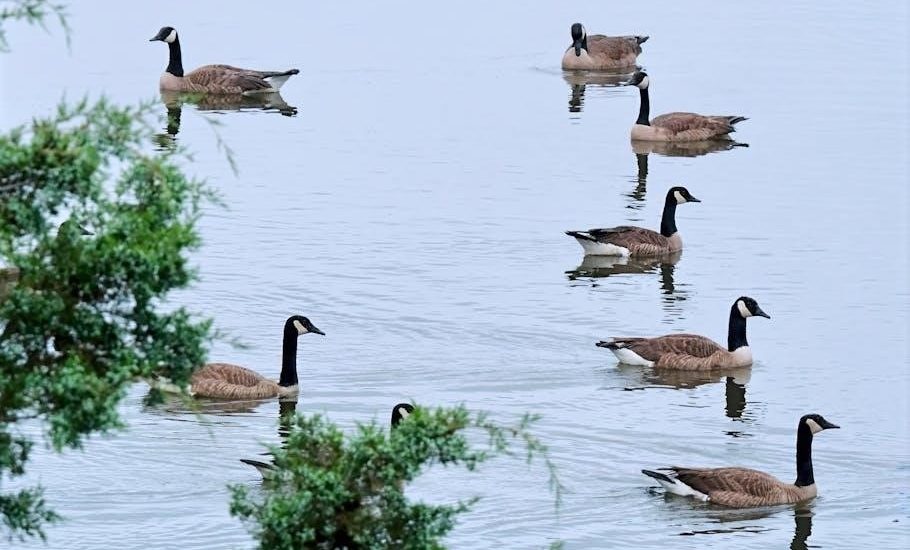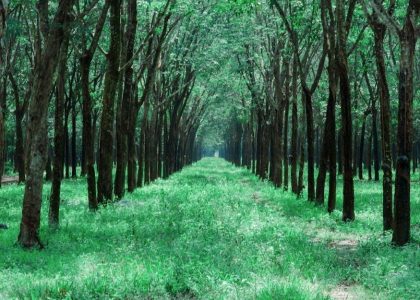A guided goose hunt offers an exhilarating outdoor experience‚ combining expert guidance‚ strategic locations‚ and traditionally proven techniques. It ensures a memorable adventure while balancing thrill and professionalism.
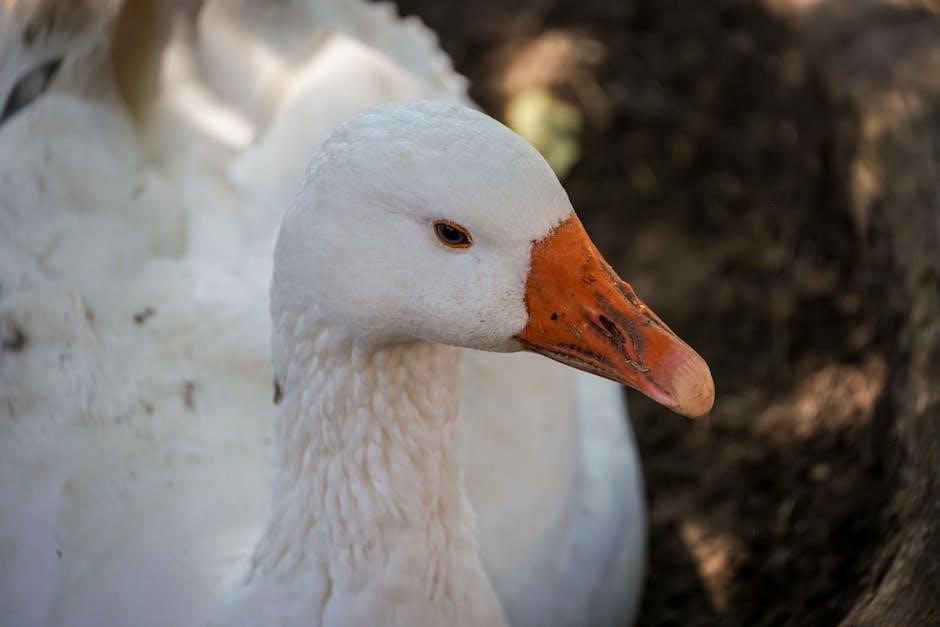
Why Choose a Guided Goose Hunt?
Choosing a guided goose hunt ensures access to expert knowledge‚ prime locations‚ and safe practices. It enhances success rates while adhering to ethical and legal hunting standards.
Expertise and Local Knowledge
Guided goose hunts benefit significantly from the guide’s extensive experience and in-depth local knowledge. Seasoned guides understand goose behavior‚ migration patterns‚ and habitats‚ ensuring optimal hunting opportunities. Their familiarity with local terrains‚ including waterfodies and feeding grounds‚ maximizes success. Guides also stay updated on weather conditions and legal regulations‚ ensuring a safe and lawful experience. This expertise allows hunters to focus on the thrill of the hunt while relying on proven strategies and techniques tailored to the specific location and season.
Access to Prime Hunting Locations
Guided goose hunts often provide access to exclusive‚ prime hunting locations that are not readily available to the public. Experienced guides secure permits and permissions for private lands‚ wetlands‚ and migratory hotspots‚ ensuring hunters are in the best positions to succeed. These strategic locations are chosen based on goose migration patterns‚ feeding habits‚ and resting areas. Accessing these sites enhances the hunting experience‚ offering a higher likelihood of encountering abundant goose populations and creating unforgettable memories in pristine natural settings.
Safety and Legal Compliance
A guided goose hunt emphasizes safety and legal compliance‚ ensuring a responsible outdoor experience. Licensed guides adhere to local regulations‚ obtain necessary permits‚ and enforce firearm safety protocols. They monitor environmental impacts‚ ensuring sustainable practices and compliance with wildlife conservation laws. This approach minimizes risks‚ protects habitats‚ and promotes ethical hunting standards‚ making the experience both enjoyable and environmentally conscious for all participants.

Understanding the Basics of Goose Hunting
Goose hunting involves strategic techniques‚ understanding bird behavior‚ and using proper gear. It requires patience‚ skill‚ and knowledge of species habits to ensure a successful and ethical hunt.
Species of Geese Commonly Hunted
Several species of geese are popular among hunters‚ including Canada Geese‚ Snow Geese‚ White-fronted Geese‚ and Ross’s Geese. Each species offers unique challenges and thrills. Canada Geese are known for their size and strong flight patterns‚ making them a favorite target. Snow Geese‚ often hunted in large flocks‚ provide exciting opportunities due to their migratory behaviors. White-fronted Geese are prized for their distinctive markings‚ while Ross’s Geese are sought for their speed and agility. Understanding these species’ habits and migration patterns is key to a successful hunt.
Methods and Techniques in Goose Hunting
Effective goose hunting relies on proven methods like decoy spreads‚ camouflage‚ and expert calling. Hunters use realistic decoys to attract geese‚ while concealment in blinds or natural cover ensures proximity. Calling techniques mimic goose sounds to lure birds within range. Flagging‚ or using wing-like props‚ adds visual cues. Guides often employ layout blinds for concealment and strategic positioning based on flight patterns. These techniques‚ combined with patience and precision‚ enhance the likelihood of a successful hunt‚ making the experience both challenging and rewarding for participants.
Planning Your Guided Goose Hunt
Planning a guided goose hunt involves organizing schedules‚ budgeting‚ and prioritizing prime locations for a smooth and successful hunting experience.
Best Time and Season for Hunting
The best time for a guided goose hunt typically aligns with migration patterns‚ often during fall and early winter. Peak seasons vary by region but generally occur between September and February. Hunts are most successful during early mornings and late afternoons when geese are actively foraging. Guides often target areas where geese frequent‚ such as wetlands and agricultural fields. Timing is crucial‚ as weather conditions and bird behavior significantly influence hunting success.
Obtaining Necessary Licenses and Permits
Before embarking on a guided goose hunt‚ obtaining the proper licenses and permits is essential. Hunters typically need a state-issued small game license and a federal waterfowl stamp. Requirements vary by region‚ so it’s crucial to check local regulations. Guides often assist with ensuring compliance‚ but hunters must understand the legal framework. Failure to obtain proper documentation can result in fines or legal consequences. Ensure all permits are up to date before the hunt begins to avoid any issues.
Essential Gear and Equipment
A guided goose hunt requires specific gear to ensure success and comfort. A reliable shotgun with steel shot‚ camouflage clothing‚ and a good pair of binoculars are must-haves. Decoys‚ both ground and aerial‚ are crucial for attracting geese. Calls‚ such as mouth calls or electronic devices‚ help mimic goose sounds. Waders or waterproof boots are necessary for marshy areas‚ and a blind or concealment gear is essential for staying hidden. Don’t forget ammunition‚ a range bag‚ and weather-appropriate clothing. Guides often provide some equipment‚ but check beforehand to ensure you’re prepared.
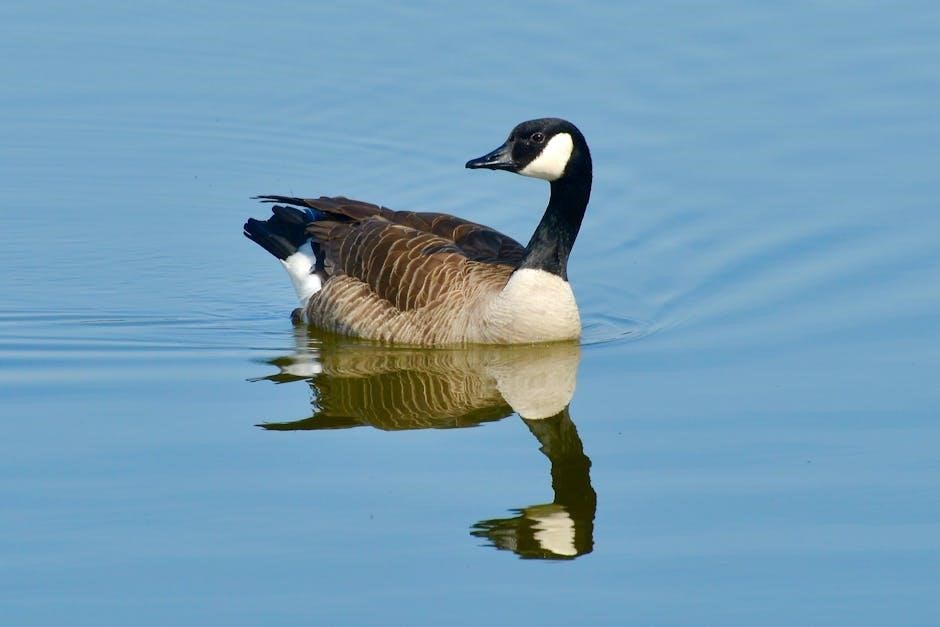
Choosing the Right Guide or Outfitter
Selecting the right guide or outfitter is crucial for a successful goose hunt. Look for experienced professionals with a proven track record‚ ensuring safety and legal compliance.
Researching Reputable Guides
Researching reputable guides is essential for a successful goose hunt. Start by reading online reviews‚ testimonials‚ and ratings from trusted sources. Use specific search queries and Boolean operators to filter reliable information. Check professional affiliations and certifications‚ ensuring they align with local regulations. Verify their experience and success rates through testimonials and references. A well-researched guide ensures safety‚ legal compliance‚ and a memorable hunting experience. Utilize advanced search tools to refine your results and identify the best fit for your needs.
Understanding the Cost and What’s Included
Understanding the cost of a guided goose hunt is crucial for budgeting. Prices vary based on location‚ guide expertise‚ and services offered. Typically‚ packages include guide fees‚ access to hunting grounds‚ and essential equipment. Some outfitters may also cover meals‚ lodging‚ and transportation. Always inquire about what’s included to avoid hidden fees. Use specific search queries and Boolean operators to find detailed package descriptions. Clear communication ensures transparency‚ helping you plan effectively and enjoy a hassle-free hunting experience tailored to your needs and preferences.
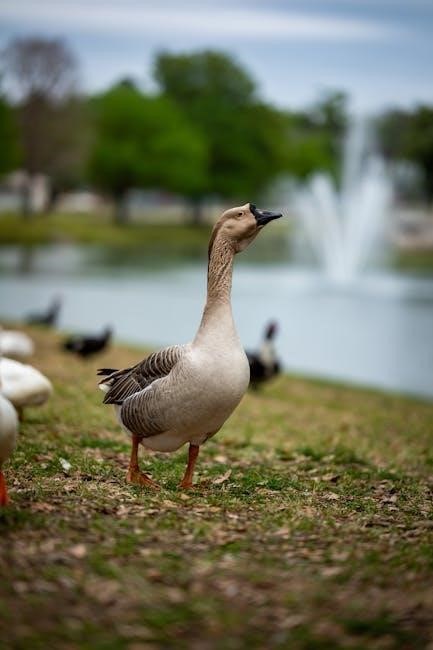
Etiquette and Ethics in Goose Hunting
Etiquette and ethics in goose hunting emphasize respecting landowners‚ fellow hunters‚ and wildlife. Sustainable practices‚ fair chase‚ and conservation efforts ensure responsible hunting‚ preserving ecosystems for future generations.
Respecting Landowners and Other Hunters
Respecting landowners and other hunters is crucial for a positive hunting experience. Always obtain permission before hunting on private property and leave the land in the same condition as found. Communicate with other hunters to avoid conflicts and ensure a safe environment. Following local regulations and ethical guidelines fosters mutual respect and cooperation‚ creating a harmonious setting for everyone involved in the guided goose hunt.
Practicing Sustainable and Responsible Hunting
Practicing sustainable and responsible hunting ensures the conservation of goose populations and their habitats. Hunters must adhere to ethical practices‚ avoiding overhunting and ensuring fair chase. Using non-toxic ammunition and respecting bag limits are critical. Responsible hunting promotes ecosystem balance and maintains healthy wildlife populations for future generations. By following these principles‚ hunters contribute to environmental stewardship while enjoying their guided goose hunt experience.
Importance of Conservation Efforts
Conservation efforts are vital for maintaining healthy goose populations and habitats. Habitat preservation‚ regulated hunting practices‚ and education on sustainable hunting methods ensure the long-term survival of waterfowl species. These efforts also protect ecosystems‚ benefiting biodiversity and ensuring that future generations can enjoy guided goose hunting. Conservation initiatives often involve collaboration between hunters‚ wildlife agencies‚ and environmental organizations‚ highlighting the role of ethical hunting in supporting ecological balance and wildlife preservation.
Safety Measures During the Hunt
Safety is paramount in guided goose hunting. Always follow firearm safety guidelines‚ prepare for unpredictable weather‚ and carry first aid kits. Stay alert and informed.
Firearm Safety Guidelines
Firearm safety is critical during a guided goose hunt. Always treat firearms as loaded‚ keep the muzzle pointed away from others‚ and use the safety catch until ready to shoot. Wear appropriate eye and ear protection to prevent injury. Ensure clear communication with fellow hunters and guides to maintain situational awareness. Never shoot without a clear target and backstop‚ and always follow local regulations and your guide’s instructions to ensure a safe and responsible hunting experience.
Preparation for Variable Weather Conditions
Preparation for variable weather is essential for a successful guided goose hunt. Check forecasts beforehand and pack layered‚ waterproof clothing to adapt to changing conditions. Bring insulated gear‚ gloves‚ and a hat for cold mornings‚ as well as breathable options for warmer periods; Stay hydrated‚ use sunscreen‚ and ensure visibility with high-visibility clothing. A backup plan and emergency shelter are crucial in case of extreme weather. Proper preparation ensures comfort and safety‚ allowing you to focus on the hunt regardless of conditions.
First Aid and Emergency Procedures
A guided goose hunt requires preparedness for emergencies. Always carry a first aid kit with essentials like bandages‚ antiseptic wipes‚ and pain relievers. Guides are trained in basic first aid and emergency response. Ensure reliable communication devices‚ such as two-way radios‚ are available. Familiarize yourself with basic first aid techniques‚ like wound cleaning and splinting. Know the nearest medical facility location. In case of severe injuries‚ prioritize stabilization and rapid evacuation. Stay alert to prevent accidents and ensure a safe‚ enjoyable hunting experience.
A guided goose hunt offers a memorable outdoor experience‚ combining excitement with expert guidance and responsible practices. By choosing reputable guides‚ hunters ensure a safe and successful adventure while supporting conservation efforts. Whether you’re a novice or an experienced hunter‚ a guided hunt provides unparalleled opportunities to connect with nature and refine your skills. Always prioritize safety‚ ethics‚ and environmental stewardship to preserve this tradition for future generations. A well-planned guided hunt promises unforgettable moments and a deeper appreciation for the sport.

